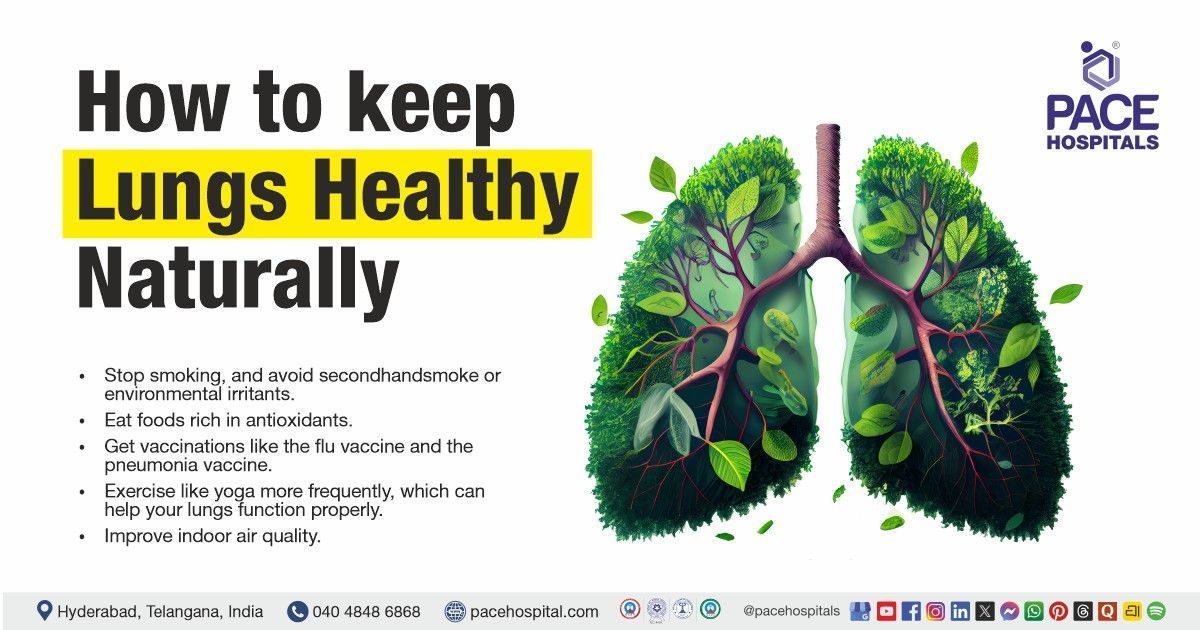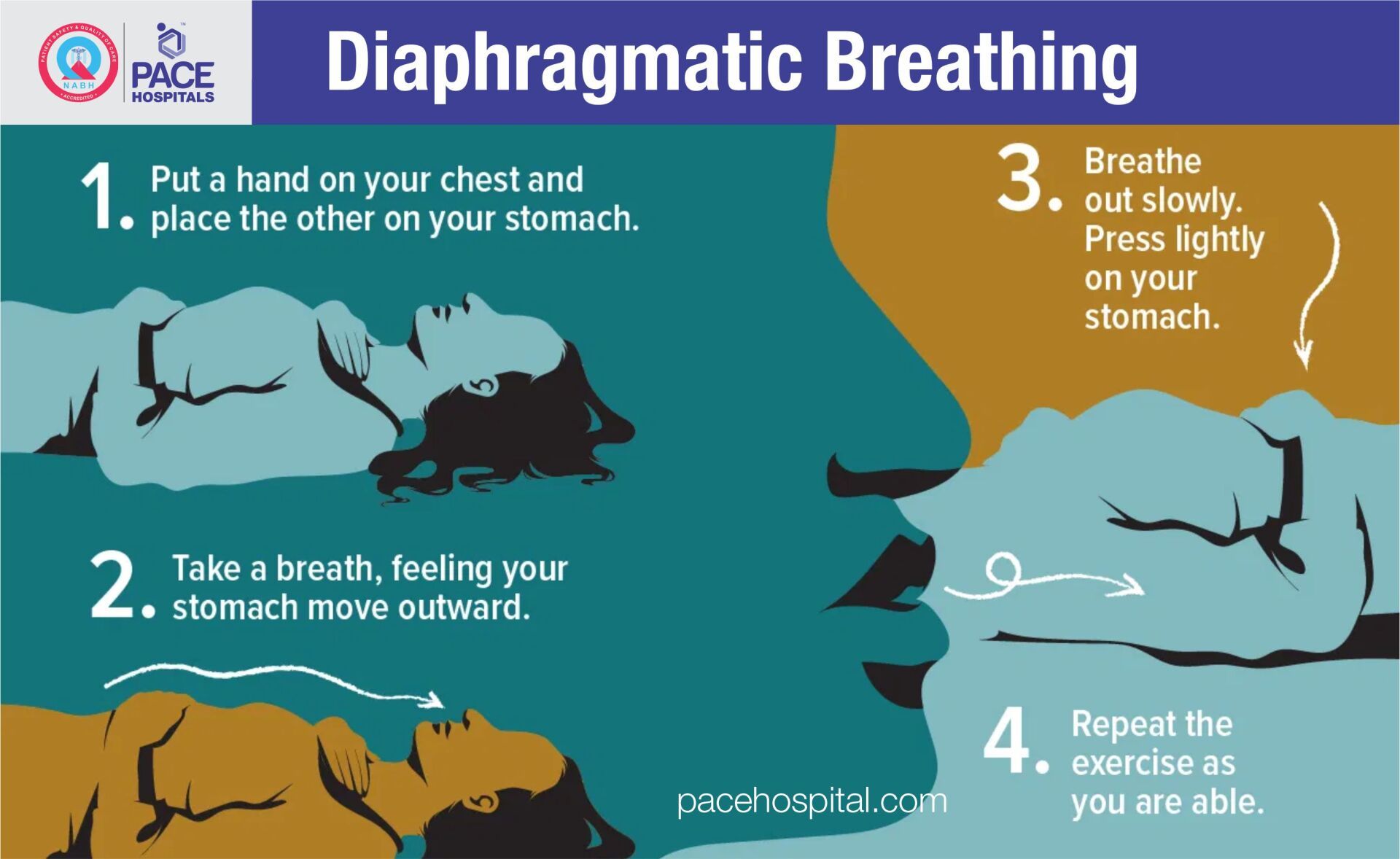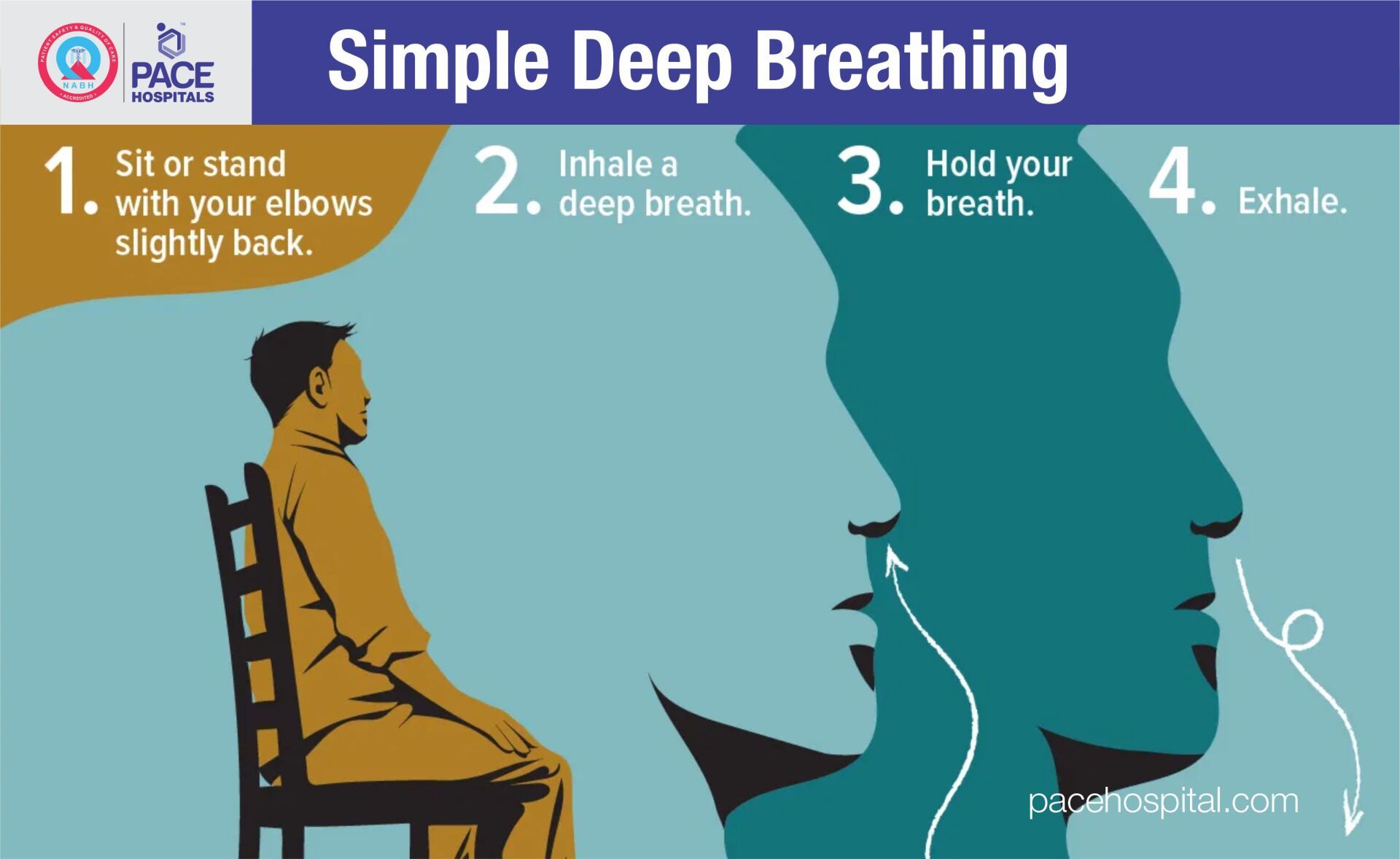How to Keep Your Lungs Healthy Naturally: 7 Effective Ways to Boost Respiratory Wellness
PACE Hospitals
Written by: Editorial Team
Medically reviewed by: Dr. Pradeep Kiran Panchadi - Consultant Pulmonologist, Specialist in Bronchoscopy and EBUS
How to Keep Your Lungs Healthy Naturally
Your lungs are the silent powerhouses of your body — working around the clock to deliver oxygen and remove carbon dioxide. Most of the time, we take them for granted until we feel short of breath or develop a respiratory issue. The fact is, maintaining lung health is easy; all you need is awareness, regular practice, and a few lifestyle adjustments.
There are many easy and efficient ways to support your lung health naturally, from diaphragmatic breathing to staying hydrated. Let's examine the top scientifically supported methods for maintaining the health and functionality of the lungs.
Why Healthy Lungs Matter
The lungs are essential to preserving general health. The lungs make sure that oxygen enters the bloodstream while releasing carbon dioxide, a waste gas, which is necessary for all of your body's cells to function. Asthma, pulmonary fibrosis, and chronic obstructive pulmonary disease (COPD) are among the long-term illnesses that can result from a decline in lung function.
The majority of lung damage can be avoided with appropriate care and prompt medical intervention. Making small lifestyle adjustments can highly improve lung capacity, promote improved oxygen exchange, and provide a stronger barrier against the negative effects of pollution.
Key Principles for Healthy Lungs
Maintaining strong and healthy lungs becomes simple when we adopt the right habits. Here are some essential practices to support long-term lung health:
- Include antioxidant-rich foods in your diet.
- Avoid smoking and protect yourself from second-hand smoke.
- Engage in regular physical activity and practice mindful yoga.
- Limit exposure to air pollution and harmful environmental irritants.
- Stay up to date with vaccinations such as flu and pneumonia shots.
- Enhance indoor air quality through proper good ventilation and cleanliness.
These changes in lifestyle are the cornerstone of the best lung protection and function. Let's now examine seven all-natural ways to enhance lung function and breathing capacity.
1. Diaphragmatic Breathing — Strengthen Your Core Breathing Muscle
Diaphragmatic breathing, or deep belly breathing, is one of the most effective exercises for improving lung capacity. It involves engaging the diaphragm — a dome-shaped muscle below the lungs — to take in more air and allow better oxygen exchange.
When you breathe deeply through the diaphragm:
- The lungs fill more completely.
- The oxygen exchange becomes more efficient.
- The respiratory muscles become stronger.
This technique is especially beneficial for people with asthma, COPD, or chronic bronchitis, as well as healthy individuals looking to expand their lung capacity.
How to Practice Diaphragmatic Breathing:
- Sit or lie down comfortably.
- Put one hand on the abdomen and the other on the chest.
- Breathe deeply through your nose, allowing your abdomen to rise instead of your chest.
- Tighten your abdominal muscles and release the breath slowly through pursed lips.
- Every day, repeat for five to ten minutes.
Professional singers and athletes often use this technique to enhance breathing control and endurance.
2. Simple Deep Breathing — Expand Lung Capacity Naturally
Simple deep breathing helps your lungs reach their full potential. It improves elasticity, encourages full air exchange, and removes stale air trapped in the lungs.
Here’s how to do it:
- Sit upright and relax your shoulders.
- Slowly inhale through the nose, expanding the belly and chest.
- Hold your breath for 3–5 seconds.
- Exhale completely, pushing out all the air from your lungs.
This “full breath” technique helps improve oxygen delivery, increases lung efficiency, and strengthens respiratory muscles. Over time, it can also reduce anxiety and promote relaxation — both of which contribute to healthier breathing.
3. Counting Your Breath — Train for Longer, Stronger Breaths
Controlled breathing or “counting your breath” is another effective method to improve lung endurance and volume. By consciously increasing the duration of inhalation and exhalation, you train your lungs to utilize their full capacity.
Practice tip:
- Inhale for a count of 4–5 seconds.
- Exhale for the same duration.
- Gradually increase the count over time (up to 7–8 seconds each).
Make sure not to strain or force your lungs. The goal is gradual improvement, not discomfort. If you experience dizziness or tightness, stop and resume normal breathing. Always consult a pulmonologist if you feel shortness of breath or chest discomfort.
4. Posture Improvement — Give Your Lungs More Room to Expand
Your posture plays a surprisingly important role in how your lungs function. A slouched position compresses the lungs and restricts air entry, while an upright or slightly reclined posture allows complete expansion.
Try this simple exercise:
- Sit in a stable chair with your feet flat on the ground.
- Lean slightly backwards, lift your chest, and breathe deeply.
- Feel your lungs expand as you take in more air.
Practicing good posture throughout the day — primarily if you work at a desk — can significantly improve your breathing efficiency. Regular stretching and yoga also help maintain an open chest cavity and a strong core, which support breathing.
5. Stay Hydrated — Keep Your Airways Clear
Your lungs are lined with a thin layer of mucus that helps trap dust, microbes, and pollutants. For this mucus to function correctly, it needs to stay hydrated.
When you drink plenty of water (at least 8–10 glasses daily):
- The mucus remains thin and easier to clear.
- Airway irritation is reduced.
- Breathing becomes smoother and more comfortable.
Dry or thick mucus can block airways, making you more prone to infections or a chronic cough. Staying well-hydrated also supports the body's overall detoxification process and immune defense.
6. Laughing — Nature’s Best Lung Exercise
For the lungs, the saying "laughing is the best medicine" is absolutely true. A good laugh helps the lungs expel old air and make room for new oxygen.
When you laugh deeply:
- The diaphragm moves rhythmically, strengthening the core breathing muscles.
- Residual air trapped in the lungs is expelled.
- The respiratory system gets a “natural cleanse.”
Frequent laughter also releases endorphins — your body’s feel-good hormones — which reduce stress and support heart and lung health. Watch a comedy show, spend time with friends, or simply find moments of joy every day — your lungs will thank you!
7. Be Active — Exercise Regularly for Better Lung Health
One of the best strategies to increase lung capacity is to engage in regular physical activity. Walking, swimming, cycling, and particularly aerobic exercises raise your heart rate and respiration rate, which enhances lung function and oxygen intake.
Even simple exercises like yoga and pranayama (controlled breathing techniques) have been shown to improve lung health. Bhujangasana (cobra pose) and Dhanurasana (bow pose) are two yoga poses that improve airflow and strengthen the respiratory muscles.
Benefits of regular exercise for the lungs:
- Strengthens respiratory muscles
- Improves lung efficiency and oxygen exchange
- Reduces stress and anxiety
- Enhances immune function
- Prevents obesity-related breathing problems
Aim for 30–45 minutes of moderate physical activity daily. Always consult your physician before starting a new workout if you have chronic lung disease or other health concerns.
Other Tips to Keep Your Lungs Healthy
- Smoking cessation: Smoking is the main cause of lung damage and diseases like COPD and lung cancer. Even exposure to second-hand smoke harms your lungs.
- Avoid Air Pollutants: Use air purifiers at home, avoid areas with heavy traffic, and wear a mask in dusty environments.
- Eat Antioxidant-Rich Foods: Foods like berries, citrus fruits, spinach, broccoli, and carrots help reduce inflammation and oxidative stress in the lungs.
- Get Vaccinated: Vaccines against pneumonia and the flu can help prevent respiratory infections that impair lung health.
- Maintain Good Hygiene: Wash your hands frequently and stay away from close contact with sick people.
The Science Behind Lung Health
Oxidative stress and inflammation are closely related to lung health. Free radicals are unstable molecules that damage lung tissue and are produced by smoking, infections, and air pollutants. These free radicals are neutralised and cellular damage is decreased by antioxidants, which are present in colourful fruits and vegetables.
Nutrients that support lung function:
- Vitamin C (from citrus fruits): Boosts immune health
- Vitamin E (from nuts and seeds): Protects lung tissue
- Beta-carotene (from carrots and sweet potatoes): Repairs epithelial cells
- Omega-3 fatty acids (found in fish and flaxseeds): Cut down on inflammation
Eating a well-balanced diet rich in these nutrients will naturally increase the resilience of your respiratory system.
Natural Breathing Exercises for Relaxation and Lung Cleansing
Using mindfulness-based breathing techniques improves lung elasticity and soothes the nervous system. Methods such as
- Kapalabhati (Skull Shining Breath),
- Anulom Vilom (Alternate Nostril Breathing)
- Bhramari Pranayama (Humming Bee Breath),
They have been shown to strengthen the diaphragm, increase oxygenation, and clear the airways. Under the right guidance, these methods can be used every day to preserve the best possible respiratory health.
Conclusion
Keeping your lungs healthy is not complicated — it’s about being consistent. Simple habits like deep breathing, staying hydrated, eating antioxidant-rich foods, exercising regularly, and avoiding smoke can make a lasting difference.
Your lungs are meant to last a lifetime, so take good care of them. By using these natural methods, you will strengthen your general vitality, energy, and longevity in addition to increasing the efficiency of your breathing.
FAQs on How to Keep Lungs Healthy Naturally
How can I improve my lung function naturally?
You can improve lung function naturally by practicing deep breathing exercises, staying active, maintaining good posture, and avoiding exposure to smoke and pollutants.
What foods help strengthen lungs?
Foods high in antioxidants and vitamins — such as carrots, citrus fruits, spinach, broccoli, walnuts, and flaxseeds — help reduce inflammation and strengthen lung tissues.
Can lungs heal after quitting smoking?
Yes. Once you quit smoking, the lungs begin to repair themselves within weeks. Cilia (tiny hair-like structures) regrow and start clearing mucus and toxins more effectively.
Are there home remedies for cleansing the lungs?
Yes. Steam inhalation, green tea, turmeric, and honey can help soothe the respiratory tract, while deep breathing exercises clear out stale air from the lungs.
How does smoking impact long-term lung health?
Smoking gradually deteriorates the airways and lung tissue, diminishing the lungs' ability to exchange oxygen efficiently. It is the leading cause of chronic obstructive pulmonary disease (COPD) and a substantial risk factor for developing lung cancer. Quitting smoking, even after years of use, can assist to prevent further damage and improve lung function.
Can stress affect breathing patterns?
Ongoing stress can disturb normal breathing by making it faster or shallower, limiting the amount of oxygen the body gets. Over time, this might lead to weariness and shortness of breath. Effective stress management promotes regulated breathing and healthy lung function.
How much water should I drink for healthy lungs?
At least 8–10 glasses of water daily help keep the mucosal lining of the lungs thin, allowing better mucus clearance and smoother breathing.
Is lung health enhanced by exercise?
Indeed. Frequent exercise helps maintain lung elasticity, strengthens respiratory muscles, and enhances oxygen utilisation.
Can laughter really improve lung health?
Yes. Laughter helps expel stale air, engages the respiratory muscles, and increases oxygen intake — making it a natural breathing exercise.
Why is maintaining healthy lungs important throughout life?
The lungs play an active and important role for supplying oxygen to all parts of the body, which is required for immunity, energy, and proper organ function. When lung health gets affected badly, changes may occur gradually and go unrecognized until symptoms such as dyspnea, fatigue, or decreased endurance emerge.
Can lifestyle habits influence the risk of lung diseases?
Yes, daily lifestyle decisions have a significant impact on lung function. Smoking, inactivity, and prolonged exposure to polluted environments can all have a negative effect on lung function. These habits increases the risk of conditions such as chronic obstructive pulmonary disease (COPD), whereas better habits help maintain lung elasticity and facilitate breathing.
Does diet play a role in keeping lungs healthy?
Diet has major impact on lung health by supporting immune strength and controlling inflammation. Antioxidant nutrients such as Vitamin C help protect lung tissue from getting damaged due to infections and environmental pollutants. A balanced diet works alongside other preventive measures to support long-term respiratory health.
Can exercise improve breathing capacity?
Regular physical activity strengthens the muscles involved in breathing and improves how efficiently the body uses oxygen. Exercise also supports better lung performance and endurance, which is particularly beneficial for individuals at risk of chronic obstructive pulmonary disease (COPD).
How does air pollution affect lung function?
Exposure to polluted air results in irritation of the respiratory tract lining and can speed up lung tissue damage. Gradually this worsens existing respiratory symptoms, increases the risk of infections, and leads to chronic lung diseases, including lung cancer in susceptible individuals and those having family history of the disease.
Are breathing exercises useful for lung health?
Breathing exercises serve to increase lung capacity, improve oxygen exchange, and encourage controlled breathing patterns. They are especially beneficial for persons who lead sedentary lifestyles or have long-term respiratory issues, as they promote increased daily exercise levels.
Is breathlessness always related to lung disease?
It cannot be said it can happen always. But poor fitness, cardiac issues, or anxiety can all cause breathlessness. However, persistent or unexplained dyspnea should be investigated to rule out lung-related reasons including chronic obstructive pulmonary disease (COPD) or early respiratory impairment.
When should lung health be evaluated even without symptoms?
People with a history of smoking, prolonged exposure to pollutant particles, or a family history of lung cancer may benefit from routine lung evaluations. Early assessment can help to indicate subtle changes before symptoms become noticeable.
How does PACE Hospitals support long-term lung health and prevention?
At PACE Hospitals, long-term lung care is centered on prevention and timely intervention through:
- Use of preventive screening and respiratory evaluations based on clinical need
- Careful assessment of personal risk factors such as workplace exposure, smoking habits, and environmental influences
- Patient guidance on lifestyle practices that improve lung strength and breathing endurance
- Ongoing observation of lung health to recognize early changes before progression occurs
When should someone consult PACE Hospitals for lung health evaluation?
Consultation at PACE Hospitals is usually recommended in situations when a person experiences various conditions such as:
- Ongoing cough, shortness of breath, or chest discomfort that does not resolve
- Frequent respiratory infections or noticeable decline in physical stamina
- A history of smoking or prolonged exposure to polluted or hazardous environments
- The need for reassurance or an initial lung health assessment as part of preventive care
What diagnostic facilities for lung health are available at PACE Hospitals?
PACE Hospitals provides comprehensive respiratory evaluation services and assessments, which include:
- Imaging investigations to detect inflammatory or structural lung abnormalities
- Lung function tests to evaluate airflow and overall breathing efficiency
- Consultations with pulmonary specialists for precise clinical assessment
- A systematic diagnostic approach aimed at achieving clarity while avoiding unnecessary procedures
How does PACE Hospitals help patients improve lung health through lifestyle care?
Lifestyle support at PACE Hospitals is personalised and based upon as follows:
- Recommendations for physical activities that enhance respiratory muscle function
- Training in breathing techniques with various practice patterns that improve oxygen utilization
- Assistance with smoking cessation and minimizing exposure to respiratory irritants
- Nutritional guidance, including advice on antioxidant intake such as Vitamin C, to support lung and immune health
Why choose PACE Hospitals for ongoing lung health care?
PACE Hospitals offers patient-centered respiratory treatment and effective care, including:
- Highly experienced pulmonologists efficient at managing conditions such as chronic obstructive pulmonary disease (COPD)
- Seamless coordination of diagnostics, counseling, and follow-up services under one system
- Strong focus on early detection and preventive management
- A long-term care approach aimed at preserving lung health rather than addressing symptoms alone
Share on
Request an appointment
Fill in the appointment form or call us instantly to book a confirmed appointment with our super specialist at 04048486868














